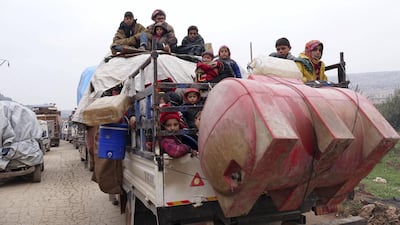Bloodshed between Turkey and government forces in Syria’s northwest Idlib province has raised the spectre of open confrontation between the neighbours.
The deaths of eight Turkish soldiers in Syrian shelling also threatened the good relationship between Turkey’s Recep Tayyip Erdogan and Russian President Vladimir Putin, the main backer of Syrian leader Bashar Al Assad.
Turkey responded to Sunday night’s attack by striking Syrian government positions that a war monitor said caused 13 Syrian fatalities. Turkey later claimed to have “neutralised” — a term it applies to killed, wounded or captured enemies — more than 70 “regime members”.
Idlib lies on the Turkish border and is the final bastion of fighters opposing Mr Al Assad’s regime. Since December, government troops have been pushing to take control of two strategic roads linking government-controlled Aleppo to Damascus and Latakia.
The fighting has seen hundreds of thousands of displaced people head towards the frontier. It has also engulfed some of the 12 Turkish military observation posts established in a 2017 Russia-Turkey agreement.
Government forces took the town of Maarat Al Numan last week, which led to Turkey trying to establish a stronghold at Saraqeb, which lies on the junction of the M4 and M5 highways. On Sunday night, it sent a large convoy of tanks, armoured personnel vehicles and other equipment across the border.
Some opposition groups are backed by Turkey but others are linked to Al Qaeda. Mr Al Assad and Mr Putin have always claimed the offensive targeted “terrorists”.
Ali Bakeer, an Ankara-based political analyst and researcher, described the escalation as the greatest threat to Turkey-Russia relations since Turkey shot down a Russian warplane over the Syrian border in 2015.
“Russia always tried to bridge the gap [between Turkey and the Syrian regime] but lately things have gone out of control and Turkey thinks this was deliberately done,” he said. “This is the most serious disagreement between [Russia and Turkey] since they decided to work together.”
However, Dr Bakeer and other observers noted that Russian-Turkish ties ran deeper than co-operation in Syria, taking in trade, energy and defence agreements.
“There’s a deep relationship between Turkey and Russia and they have common interests on many levels,” he said. “But Turkey obviously believes Assad wouldn’t be able to do this unless there was Russian agreement.”
Selim Sazak, research director at Ankara consultancy TUM Strategy, said Turkey and Russia’s common interests had seen them become “allies of convenience” across a broad sphere.
However, Russia had failed to provide Ankara’s most basic aims in Syria, namely halting the regime attacks that were driving displaced civilians towards its border. Turkey currently hosts around 3.6 million Syrian refugees — an issue that has become increasingly politicised in recent years.
“Russia is not able to keep its side of the bargain and rein in Assad,” he said.
Turkey was more vulnerable to the prospect of further casualties than the Syrian regime, according to Kamal Alam, a UK-based military analyst who recently wrote about Turkish-Syrian relations.
“For Erdogan, even though he feeds off international conflicts for his domestic base, losing soldiers isn’t good domestically,” he said, adding that the Syrian military was used to taking casualties.
“Turkey can’t do any more damage than what’s already been done,” he said.
The deaths of Turkish and Syrian soldiers was the first time in the nine-year conflict that the militaries of any country had directly targeted one another.
“After five or six years of proxy fighting, this is the first time the regime has hit Turkish soldiers,” Mr Sazak said. “The two have been enemies all that time but now we have the soldiers of one sovereign state killing the soldiers of another sovereign state.”
Dr Bakeer said Turkey had previously warned Russia that hitting Turkish troops was a “red line” for Ankara. “They said they would retaliate and this message was delivered to Russia but despite that Assad attacked Turkish positions.”
He added that “the rules of the game need to be rewritten” to salvage future plans for a post-conflict Syria as envisioned in the 2017 Astana process drawn up by Turkey, Russia and Iran.
However, Mr Erdogan last week told reporters the Astana deal, which established a “de-escalation zone” in Idlib as part of an agreement to bring peace and political reform to Syria, was non-existent.
On Monday, Turkish Foreign Minister Mevlut Cavusoglu spoke with his Russian counterpart Sergey Lavrov by telephone.
“Russia will try to avoid further escalation and maintain the balance,” Dr Alam said. “Although they’ve always favoured the Syrians over Turkey, Russia will want to come to some arrangement for drawn-out, phased solution in Idlib that will see Turkish troops withdraw.”










